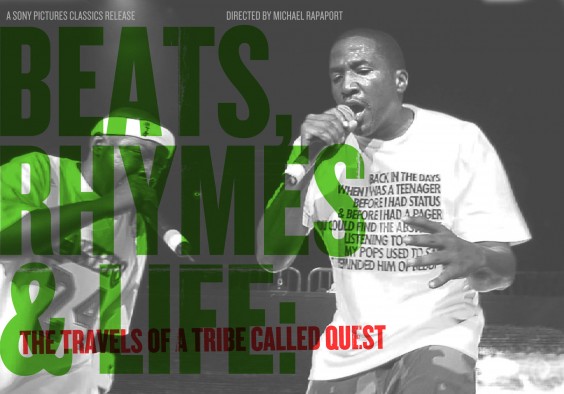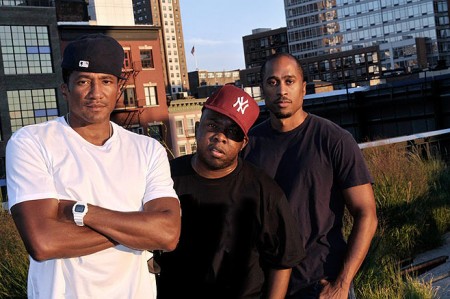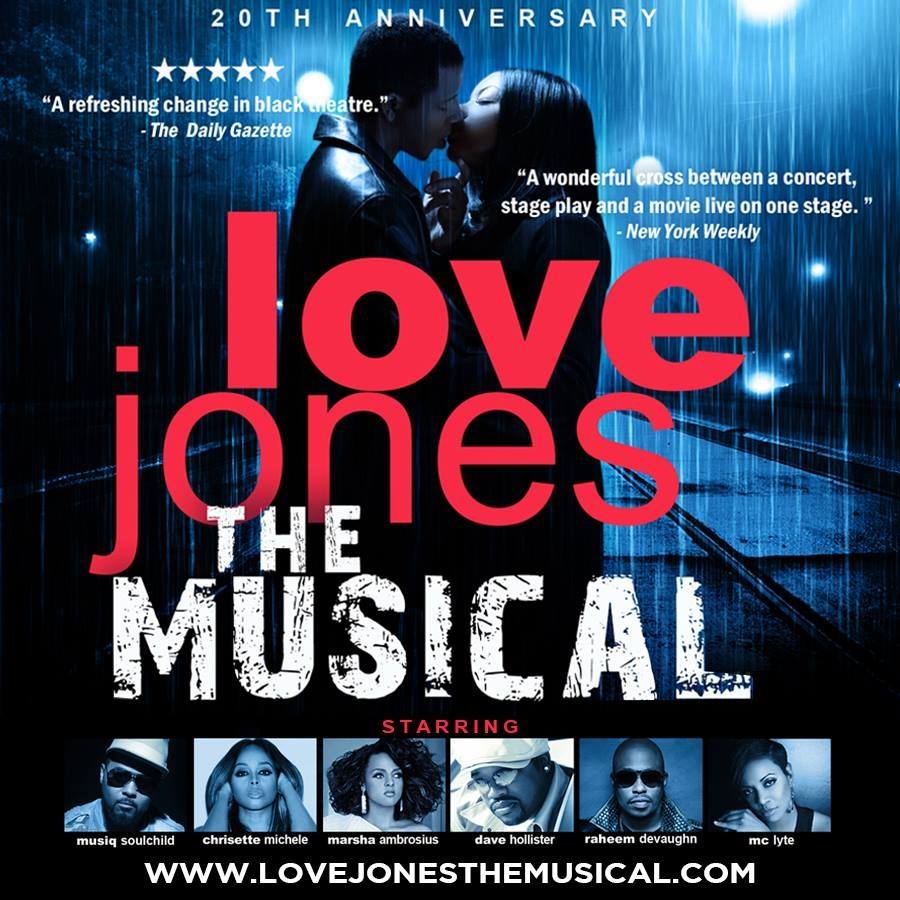Just like there is a difference between trendy ‘rap’ and intelligent ‘hip-hop,’ these is also a difference between average dudes on the mic spitting rhymes over loops and the thoughtful, even transcendent qualities unearthed when one encounters the four-man collective known as A Tribe Called Quest. It’s been over a decade since Phife Dawg, Ali Shaheed Muhammad, Q-Tip and Jarobi recorded their last CD and three years since they’ve performed together in a US tour, but their string of gold and platinum-selling CDs, an innovative, anti-thug and jazz-soaked approach to hip-hop and their yin-and-yang exchange of delivery endeared them to millions of fans, one of them being actor Michael Rapaport (“Higher Learning,” “Zebra,” “Bamboozled”), who transformed his devotion into a compelling documentary entitled Beats, Rhymes and Life, The Travels of a Tribe Called Quest.
Nominated for a Grammy earlier this year, the 98 minute film examines the ground-breaking collective’s beginnings as hip-hop-loving kids in Queens NY, connecting with Brooklyn-born Ali in high school, their serendipitous connections to the iconic Red Alert and the future Native Tongues Posse, a red-hot streak of three consecutive hit CDs (starting with 1989’s People’s Instinctive Travels and Paths of Rhythm) and the personal and professional dramas that made them struggle through the last two before things fell apart in 1998.
When the film made its debut at Dallas’ Angelika Film Center, Mr. Rapaport and Dallas native and executive producer Niraj Bhatia took in the film with an enthusiastic group of ‘Questers’ and ‘Tribeheads’ (myself included). Immediately afterwards, the egregious and outspoken filmmaker answered questions about various aspects of the band, the documentary and the hip-hop industry altogether……
ON WHAT INSPIRED THE FILM: “I’ve always loved music documentaries and watched many films about The Beatles, Jimi Hendrix and The Rolling Stones, but I always felt that ATCQ was as important as those guys. When the group broke up in 1998, I was at that last show that we have that footage from (at the club Tramps), and I remember telling my girlfriend at the time,’I feel like my parents are getting divorced.’ EPMD broke up, Nice N’ Smooth broke up, Public enemy broke up….you just never felt that it would happen to ATCQ because the music was so positive. So I set out, with the documentary, to find out ‘Why.’”
ON THE CONNECTIONS AND THE CONFLICTS: “I’ve known Q-Tip for about fifteen years, but I never knew anything about the dynamics of the group. When I started filming in 2008 and saw the intensity of their dysfunction while on this lucrative tour (“Rock the Bells”), where the dates were only on the weekends and they’re just flying in to bang out the shows every time…It was very surprising and hard to be around. You could just feel it wasn’t all hunky-dory, but they weren’t seething or hate each other ….they’re like brothers. They have their good days and their bad days. I’ll fly up to Canada to see my brother, he’ll bump into me, we’ll fist-fight and I’ll want to leave again in five minutes, but if you did it, I’d just say ‘excuse me.’ They’ve literally known each other since they were three yrs old, their parents know each other and are like a family. They’re both married to the Tribe thing that we fans don’t want to let go of, but for them, it’s a little bit of a burden at times. When it came to Phife’s illness, it was the one thing we had to tone down (in the documentary), because he was in really dire straits. When he talked about holding onto Jarobi on stage to get the rhymes out, we left out that he brought his dialysis bags out on the road all the time…it was really hard.”
ON THE INFAMOUS ‘FIGHT’ SCENE: “At first I was like, ‘oh s***, I can’t believe this is happening, but then at the same time, the filmmaker in me is like, ‘don’t f***this up.’ I was just praying that the footage came out right. Nothing was off-limits, they never told me to turn the camera off, except for being in the dressing room, which was a credit to the group. They knew what they were getting into creating the film, we’d discussed it…they knew it wasn’t a beauty pageant. I wanted the film to have honesty and emotion, just like the music does. To this day, I’ve never been in the same room with all four of them, I used to tell Jarobi that I thought he was wearing a mask and that him and Phife we was f***ing around with me on some “Mission Impossible” s***. I showed all of them the film individually, and all of them had different thoughts: One of them said ‘don’t change anything,’ one of them said ‘change everything,’ another one said, ‘I’m not mad at you Mike— I love the movie, f*** those guys!’ This is what I’m dealing with as a filmmaker.
“All the stuff that happened in the press (Q-Tip speaking out against Beats…. And refusing to discuss it in the press) was upsetting and unexpected. Listen, I love Q-Tip, we went hard on each other about the film, but if it were up to him, we’d still be shooting the f***ing movie. It was done, it had to be done, it’s not gonna be all pretty. Part of the problem is their dysfunction, and it’s hard to see that, admit that and let the fans see that….It if was about any other hip hop group, like Wu-Tang for instance, it was be considered a joke, people would say it was soft. Hip-hop is a rough business with dudes who usually come from the bottom, and they’re just nice guys from queens, Ali’s from Brooklyn, they come from nice families and they always wanted to do music. They broke that expected stereotype of ‘I’m sitting here in jail about to write some rhymes,’ and I’m proud to be a part of that.”
HOW “BEATS” CAME TO LIFE: “The reason why I was able to get people to work for next to nothing was because they love TCQ. My editor, assistant editor… they all love Tribe. The hardest part, outside of editing, was the music clearances, you need to clear every song, which I obviously did with the group, but after that I had to clear every sample for every song, and some songs had two or three samples. Believe me, you can’t hide from Lou Reed or Stevie Wonder. My animator did a sequence to “Footprints,” and we didn’t have the song cleared. I call up the guy who handles Stevie’s publishing, who tells me ‘okay, it costs this much.’ I tell him ‘that’s cool…but I don’t even have close to that, and negotiating would be disrespectful because even if I had a million dollars, it wouldn’t be enough because it’s Stevie.’ But I had that talk 83 other times and samples did get cleared on the strength that they thought what Tribe had done with their music was respectable. Lou Reed was the hardest one, he owns all of the publishing and this isn’t “Avatar,” we couldn’t pay him what they would pay or even like Kia could for Black Sheep’s “The Choice Is Yours.” My dream for Tribe is that they get ‘Bonita Applebaum’ licensed for a Pampers commercial, because the song is so cute.”
ON GATHERING FOOTAGE FOR “BEATS”: “If you want to go for broke and actually get the film released, you can’t just yank the footage from YouTube to stick it in the film, you’re gonna have to license it. Q-Tip had a lot of vintage footage but lost his entire collection, along with a ton of vinyl, in a fire. A lot of what we used was from MTV and BET, who were supportive of the film, but you gotta pay to play. The ‘Can I Kick It’ scene (where Q-Tip demonstrates how he looped the track) was the first interview I’d done with Q-Tip for the film: I didn’t ask him to do it, he just got up, got the record and started laying out the song. It was the first signal that he was getting comfortable with this entire process . Q-Tip and his music collection is the same like Phife and sports, he’s very comfortable with it and passionate about it. He’s so familiar and educated, but doesn’t talk down to you. The thing about Phife and sports is, everytime I would talk to him about a song—like, ‘yo, tell me about how you came up with the song ‘Butter’’—and somehow we’d be talking about Walter Payton. You can only go to the same well so many times, and that one instance with Tip was so genuine that I wanted to let it stand alone.
ON WHAT BROKE THEM UP: “When they first got signed around 17 or 18, it wasn’t like they got jerked, they had good lawyers, but they became superstars. The music changed and the business of hip-hop changed. You couldn’t just sample what you wanted anymore, you had to pay….a LOT. That affected them, then they became stars and wanted to revamp the agreement, that affected them too. We all have bosses, and you’ve all said at one point ‘F*** you!’ Bands are always saying “f*** the label, f*** the label,” and I didn’t want that to be the bail-out as to how the group really broke up and the label thing felt like a cliché to me. We all have problems with our bosses. When I spoke to Tribe about why they broke up, it was because of what was going on in the group, not because of the label.”
ON ATCQ’S IMPACT, LEGACY AND FUTURE: “Without the existence of ATCQ, Kanye West would not exist, Outkast would not exist, then there’s Common, Jay Electronica…..there’s something about the music that’s hard to articulate. They did it at the highest level, because as complex as the science was in putting the music together, it’s so simple to listen to and appreciate.
“Do I think they’ll get back together? I don’t know. Tribe had one more CD left on their contract with Jive, and since the film’s come out, I’ve heard rumblings of different things. It would be great for hip-hop and it would be great for the fans, and of course, great for them, but because they also know how high the bar has been set, they’re not going to put out just anything, especially after all this time, that isn’t truly, truly special. My suggestion is to give away all of the publishing (rights) and let Q-Tip have free reign of the samples, that would make a new TCQ CD a real knock out.”
http://knowshi.com/?p=3577






